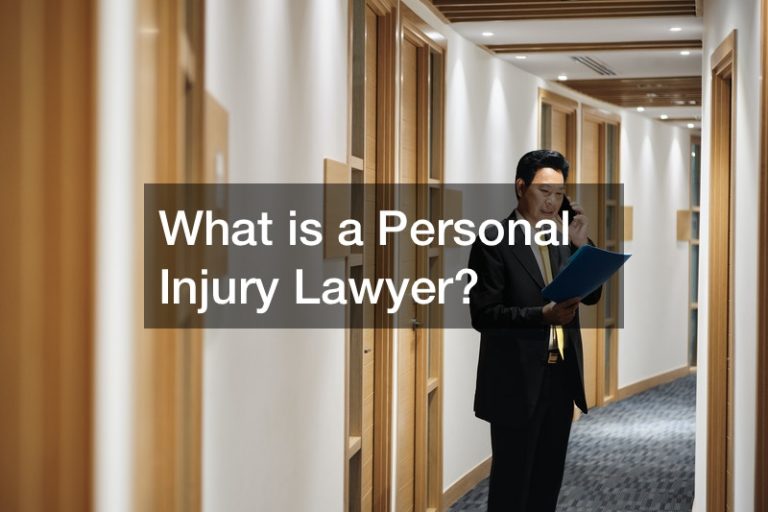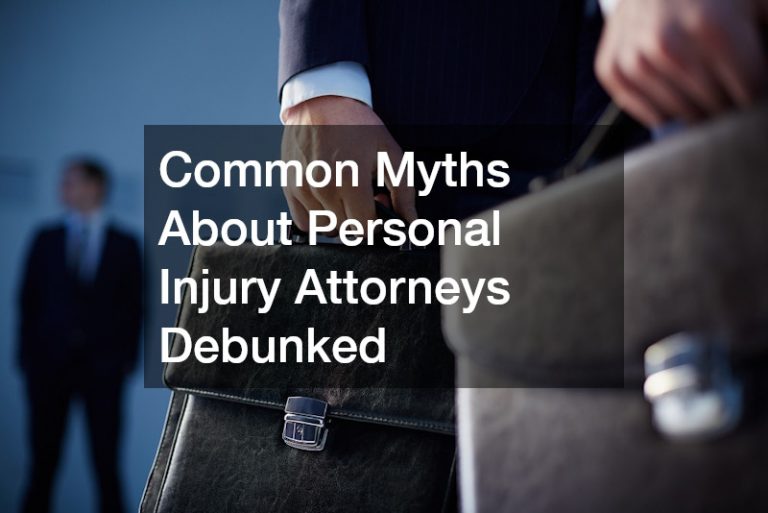Criminal Law: Know the Differences Between Being Charged and Convicted

Understanding the difference between convicted and charged is fundamental in navigating the criminal justice system. Many individuals may find themselves confused by the legal terms and processes associated with criminal law, especially since the journey from being accused of a crime to being convicted can be complex. This article breaks down each of the key steps involved, from charges being filed against an individual to the conviction process, and the significant implications each stage has on a person’s life.
1. What Does It Mean to Be Charged?
Being charged with a crime is the formal accusation that someone has committed a criminal offense. When a person is charged, they are officially accused by the state or federal government of engaging in illegal activity. The charge does not imply guilt, but it means the legal process will begin. Charges can be brought in a variety of ways, including through arrest, a grand jury indictment, or by a law enforcement officer filing a complaint.
When someone is charged, they will typically be informed of the nature of the crime and the legal ramifications they face. Charges may range from minor infractions to serious felonies, and being charged triggers various legal procedures, such as the right to counsel, bail hearings, and the potential for a trial. A criminal attorney is essential at this stage, as they help the accused understand the charges, explore defense options, and navigate the complex legal process. The legal process that follows the charging stage determines whether or not the accused will be convicted.
2. The Role of Law Enforcement in Filing Charges
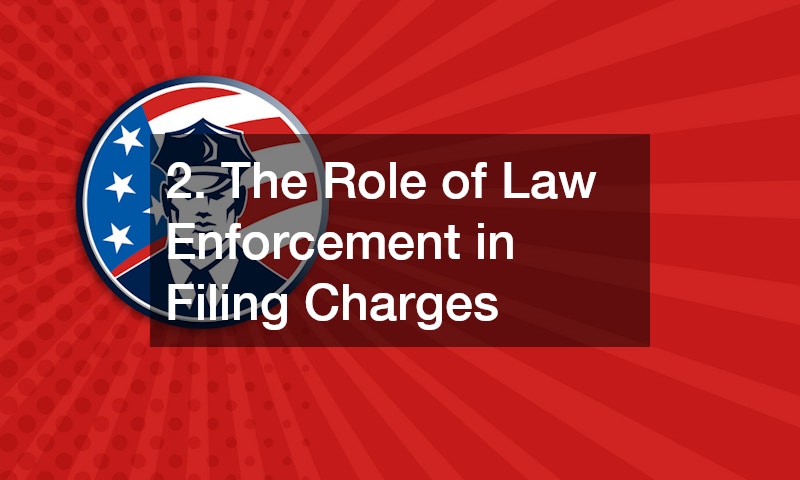
Law enforcement plays a pivotal role in the filing of criminal charges. When a crime is committed, law enforcement officers are responsible for investigating the incident, gathering evidence, and determining if there is sufficient cause to arrest someone. Once an arrest is made, they compile reports, gather witness testimony, and submit evidence to prosecutors.
Prosecutors, who represent the government in criminal cases, will review the evidence collected by law enforcement. Based on this review, they will decide whether to file formal charges against an individual. In some cases, law enforcement may make an arrest before charges are filed, while in others, charges are brought first based on evidence and legal assessments.
3. Types of Criminal Charges: Felonies, Misdemeanors, and Infractions
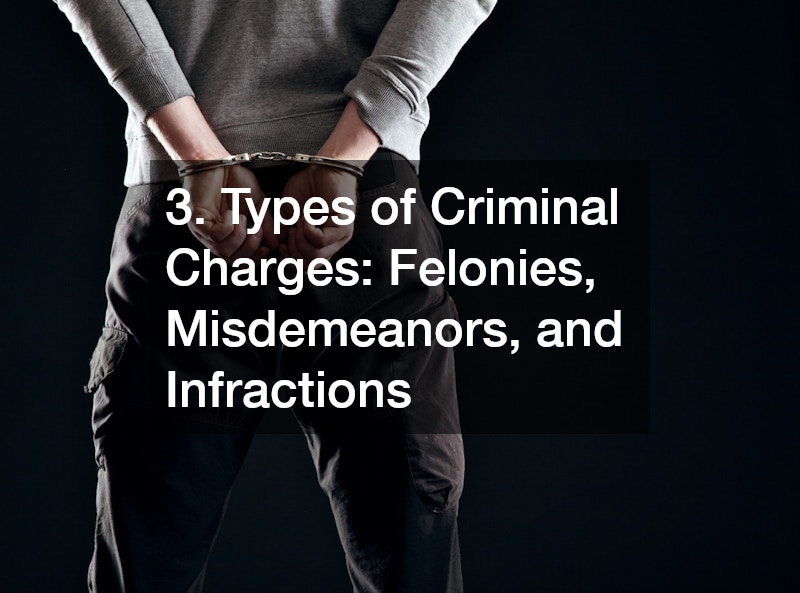
Criminal charges can be categorized into different types, each with its own level of severity and potential consequences. The most common categories are felonies, misdemeanors, and infractions.
Felony:
Felonies are the most serious charges and often carry severe penalties, including long prison sentences or even the death penalty in certain jurisdictions. Felonies include crimes like murder, sexual assault, robbery, kidnapping, armed burglary, arson, drug trafficking, and human trafficking.
Convictions for felonies can result in significant long-term consequences, such as lengthy imprisonment, life sentences, or a permanent criminal record. Felony convictions can severely impact an individual’s future, making it difficult to find employment, housing, or secure certain professional licenses.
Misdemeanor:
Misdemeanors are less severe offenses, but they still carry potential penalties such as fines, probation, or jail time (usually less than a year). Common misdemeanor crimes include petty theft, simple assault, and driving under the influence (DUI).
In cases of domestic violence, a domestic violence attorney or a divorce lawyer with experience in domestic violence matters can assist individuals in navigating the legal aspects of abuse, particularly when issues such as child custody or spousal support are involved. Similarly, if the misdemeanor charge involves driving while intoxicated, a DWI attorney would be the legal expert to handle the case, focusing on potential penalties and defense strategies.
While the penalties for misdemeanors are less severe than for felonies, they can still significantly impact a person’s life.
Infraction:
Infractions are minor violations, often referred to as “tickets” or “violations.” Examples include speeding tickets, jaywalking, running a red light, littering, or failure to wear a seatbelt.
While infractions usually do not result in jail time, they may result in fines or other minor penalties, such as a warning or community service. Infractions are typically not considered criminal offenses and generally do not carry a criminal record, though multiple infractions could lead to more severe consequences, such as a suspended license or increased fines.
Understanding the distinction between these types of charges is crucial because it impacts the legal procedures involved, the potential penalties, and the long-term consequences for the accused.
4. What Does It Mean to Be Convicted?
Being convicted of a crime means that a court has found an individual guilty of the offense they were charged with. A conviction occurs after the trial process, and it signifies that the evidence presented has proven beyond a reasonable doubt that the accused committed the crime. A conviction is the result of a guilty plea, a verdict from a judge in a bench trial, or a jury’s decision in a jury trial.
A conviction carries legal and personal consequences, including criminal penalties, fines, and possible imprisonment. The severity of these consequences varies depending on the crime, whether the individual has a criminal history, and other factors. Convictions are recorded and can remain on an individual’s permanent criminal record, affecting future opportunities for employment, housing, and other aspects of life.
5. The Criminal Trial Process: From Charge to Conviction
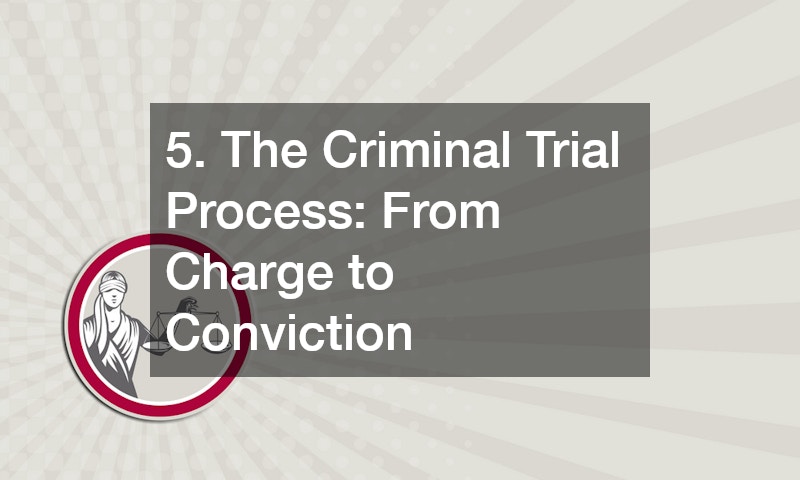
Once someone has been charged with a crime, the criminal trial process begins. This process can be lengthy and complicated, involving various stages before a conviction is reached. Here is an overview of the key steps in the criminal trial process:
Arraignment:
The first court appearance after an individual has been charged is the arraignment, where the accused is formally presented with the charges and asked to enter a plea (guilty, not guilty, or no contest).
Pre-Trial Motions:
Before the trial begins, there may be hearings to address any legal issues that need to be resolved, such as motions to dismiss evidence, change venues, or suppress certain testimony.
Trial:
During the trial, both the prosecution and defense present evidence and argue their case. The prosecution must prove the guilt of the accused beyond a reasonable doubt, while the defense seeks to challenge the evidence and introduce reasonable doubt.
Throughout this process, the accused may be required to post a large bond to ensure their appearance in court. The bond amount typically depends on the severity of the charge and the likelihood that the defendant will flee before the trial is completed.
6. Burden of Proof: The Role of Evidence in Charges and Convictions
In criminal law, the burden of proof lies with the prosecution. This means that the prosecution is responsible for presenting enough evidence to prove the accused’s guilt beyond a reasonable doubt. Evidence plays a pivotal role in both the charge and conviction stages, influencing the outcome of a case.
Charges:
At the charging stage, the prosecution must have probable cause, or a reasonable belief that a crime was committed and that the defendant is responsible. Law enforcement gathers evidence to support this belief, such as witness statements, forensic evidence, or physical evidence.
Conviction:
In the trial, the prosecution must prove the defendant’s guilt beyond a reasonable doubt, which is a much higher standard than probable cause. This requires compelling evidence, including physical evidence, testimony from witnesses, and expert reports. If the prosecution fails to meet this burden, the defendant is acquitted. A defense attorney plays a crucial role in challenging the evidence and presenting alternative interpretations to create reasonable doubt.
The presentation and evaluation of evidence are crucial in determining whether an individual is convicted or acquitted.
7. The Rights of the Accused: Protecting the Innocent
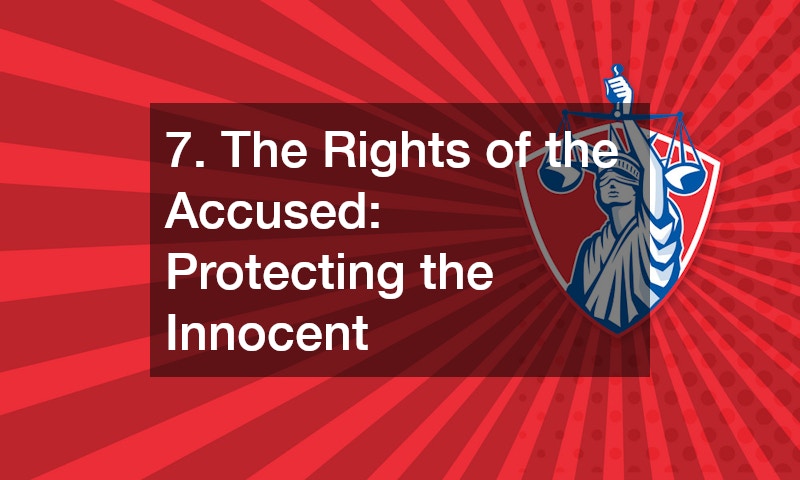
The criminal justice system is designed to protect the rights of the accused, ensuring a fair trial and the opportunity to defend oneself against accusations. The rights of the accused include:
- Right to remain silent: Individuals have the right to avoid self-incrimination and cannot be forced to testify against themselves.
- Right to legal counsel: Every accused person has the right to an attorney, and if they cannot afford one, an attorney will be appointed for them.
- Right to a fair trial: The accused is entitled to a trial by a jury of their peers and should be presumed innocent until proven guilty.
These protections help prevent wrongful convictions and ensure that individuals are treated fairly throughout the criminal process. Criminal defense attorneys play a vital role in safeguarding these rights, ensuring that the accused receive competent representation and that justice is upheld.
8. Penalties and Consequences of Being Charged vs. Convicted
Being charged with a crime and being convicted of a crime result in different sets of consequences.
Being Charged:
Being charged with a crime does not mean that an individual is guilty. However, the mere act of being charged can bring about social, professional, and financial consequences. For example, a person may lose their job, face damage to their reputation, or experience emotional distress. In some cases, individuals may need to seek the services of bail bond companies to secure their release pending trial.
Being Convicted:
If convicted, the consequences are much more severe and permanent. A conviction can result in criminal penalties such as fines, probation, or imprisonment. Additionally, a criminal conviction stays on a person’s record, which can affect their ability to obtain employment, housing, and loans, and can severely impact their social standing. A bail bondsman may be involved if a person is granted bail. If unable to pay the full amount, they might need bail bonds to cover the cost.
9. Can Charges Be Dropped or Dismissed?
Yes, charges can be dropped or dismissed under certain circumstances. If the prosecution or law enforcement does not have enough evidence to proceed, they may choose to drop the charges. Additionally, a judge may dismiss charges if they believe there is insufficient evidence or if the legal process has been violated in some way.
Common reasons for charges being dropped include lack of evidence, failure of witnesses to testify, or procedural errors that violate the defendant’s rights. However, just because charges are dropped does not mean the individual is free from all consequences, as the case may still be a matter of public record. In cases where charges are still pending, the accused may have already arranged for a bail bond to secure their release before trial.
10. Appealing a Conviction: The Road to Exoneration
Appealing a conviction is an option for individuals who believe they have been wrongly convicted. An appeal is not a retrial but a review of the legal procedures and decisions made during the trial. If an appellate court finds errors in the trial process, such as improper instructions given to the jury or the admission of unlawful evidence, they may reverse the conviction or order a new trial.
Appealing a conviction can be a lengthy and expensive process, but it provides an opportunity for individuals to prove their innocence or obtain a fairer trial.
11. The Impact on Reputation: Charged vs. Convicted
The impact on an individual’s reputation is significant whether they are charged or convicted. Being charged with a crime can tarnish an individual’s reputation, especially in the court of public opinion. Even though charges do not equate to guilt, the stigma can affect relationships, employment opportunities, and social standing.
However, a conviction carries even more significant reputational damage. A conviction is an official legal finding of guilt and can have lasting effects on a person’s future. It often leads to social ostracism, professional consequences, and can limit an individual’s rights, such as the right to vote or own firearms.
In both cases, the reputational damage can linger long after the legal process is over, and it highlights the importance of understanding the differences between being charged and convicted.
Key Takeaways
The journey from being charged with a crime to being convicted is a complex and often overwhelming experience. The distinction between the two stages—being charged and being convicted—has significant implications for an individual’s life. Understanding the legal processes, rights, and potential consequences can help individuals navigate the criminal justice system with a better understanding of their options and protections. Whether you are facing charges or a conviction, it is crucial to seek legal representation and ensure that your rights are upheld at every stage of the process.


